Oregon Scientific BAR 686A Handleiding
Oregon Scientific
Weerstation
BAR 686A
Bekijk gratis de handleiding van Oregon Scientific BAR 686A (4 pagina’s), behorend tot de categorie Weerstation. Deze gids werd als nuttig beoordeeld door 33 mensen en kreeg gemiddeld 4.7 sterren uit 17 reviews. Heb je een vraag over Oregon Scientific BAR 686A of wil je andere gebruikers van dit product iets vragen? Stel een vraag
Pagina 1/4

INTRODUCTION
Thank you for selecting this Oregon Scientic
TM Wireless
Weather Forecaster with Temperature Display and Self
- Setting Atomic Clock (BAR686A). This clock is supplied
with a remote sensor (THN122N) and can support up to 3
sensors in total (additional sensors sold separately).
NOTE Please keep this manual handy as you use your
new product. It contains practical step-by-step instructions,
as well as technical specications and warnings you should
know about.
CLOCK OVERVIEW
FRONT VIEW
1. SNOOZE
BACK VIEW
1. / : Increase / decrease setting; activate / deactivate
clock reception signal
2. : Switch remote sensor displayCHANNEL
3. : Change settings / displayMODE
4. : View alarm status; set alarmALARM
5. Battery compartment
6. TEMP HI / LO : Change settings or enable / disable
hi or lo temperature alarm for channel 1
7. : Select temperature unit°C / °F
8. : View current, maximum and minimum MEM
temperature / humidity
9. : Reset unit to default settingsRESET
LCD DISPLAY
1. Sensor battery low
2. Ice warning is active
3. Pressure trend
4. Weather Forecast
5. Alarm set
6. AM / PM mode selected
7. Clock signal reception
8. Clock
9. Sensor reception icon
10. Hi / lo temperature alarm
11. Outdoor temperature trend
12. Outdoor temperature
13. Max / Min icon
14. Main unit battery low
15. Indoor temperature trend
16. Indoor temperature
17. Max / Min icon
18. Main unit sensor icon
19. Alarm mode
20. Moon Phase
21. Day and Month display
REMOTE SENSOR (THN122N)
1. LED status indicator:
Blinks red during data
transmission
2. Ventilation duct
1. Wall mount hole
2. hole RESET
3. switchCHANNEL
4. Battery compartment
GETTING STARTED
SETTING UP THE CLOCK
Insert batteries before rst use, matching the polarity (+
and -). after each battery change.RESET
SENSOR DATA TRANSMISSION
indicates main unit batteries are low.
NOTE Do not use rechargeable batteries. We recommend
that you use alkaline batteries with this product for longer
usage and lithium batteries in temperatures below
freezing.
REMOTE SENSOR
3. Select a channel. Make sure you use a different channel
for each sensor.
4. Place the sensor near the main unit. Press RESET on
the sensor.
5. Simultaneously press CHANNEL and MEM on the main
unit to initiate signal sending between the sensor and
main unit.
6. Close the battery door and secure the screws.
7. Place the sensor in the desired location using the table
stand or wall mount.
For best results:
• Place the sensor out of direct sunlight and moisture.
• Do not place the sensor more than 30 m (100 ft) from
the main (indoor) unit.
• Position the sensor so that it faces the main (indoor)
unit, minimizing obstructions such as doors, walls, and
furniture.
• Place the sensor in a location with a clear view to the
sky, away from metallic or electronic objects.
• Position the sensor close to the main unit during cold
winter months as below-freezing temperatures may
affect battery performance and signal transmission.
The transmission range may vary depending on many
factors. You may need to experiment with various locations
to get the best results.
Standard Alkaline batteries contain signicant amounts of
water. Because of this they will freeze in low temperatures
of approximately -12°C (10°F). Disposable Lithium batteries
have a much lower threshold for temperature with an
estimated freezing range of below -30°C (-22°F).
Wireless ranges can be impacted by a variety of factors
such as extremely cold temperatures. Extreme cold may
temporarily reduce the effective range between the sensor
and the base station. If the unit's performance fails due to
low temperature, the unit will resume proper functioning
as the temperature rises to within the normal temperature
range (i.e. no permanent damage will occur to the unit due
to low temperatures).
Data is sent from the sensor(s) every 40 seconds. The
sensor reception icon in the remote sensor area shows
the status.
To search for a sensor:
Simultaneously, press and hold and for MEM CHANNEL
2 seconds.
NOTE If the sensor is still not found, check the batteries,
obstructions, and remote unit location.
CLOCK
CLOCK RECEPTION
This product is designed to synchronize its date and time
automatically once it is within range of the WWVB-60 signal
from the atomic clock in Boulder, Colorado.
RECEPTION SIGNAL
Clock signal reception indicator:
SET CLOCK
To manually set the clock make sure the clock signal
reception is disabled.
1. Press and hold for 2 seconds.MODE
2. Select the US time zone (Pacic (P), Eastern (E), Central
(C) and Mountain (M)), hour, minute, year, month/day
format, month, day and language. Press or to
change the setting.
3. Press to conrm.MODE
NOTE The language options are (E) English, (D) German,
(F) French, (I) Italian, and (S) Spanish.
Press to choose between the clock with seconds MODE
and clock with weekday display modes.
ALARM
To set the alarm:
1. Press and hold for 2 seconds.ALARM
2. Press / to set hour / minute.
3. Press or ALARM MODE to conrm. indicates alarm
is ON.
To toggle alarms ON / OFF:
1. Press to display alarm time.ALARM
2. Press again to turn alarm ON / OFF.ALARM
To silence the alarm:
• Press to silence it for 8 minutes.SNOOZE
OR
• Press any key except to turn the alarm off SNOOZE
and activate it again after 24 hours.
WEATHER FORECAST
This product forecasts the next 12 to 24 hours of weather
within a 30-50 km (19-31 mile) radius based on barometric
pressure trend readings.
ICON DESCRIPTION
Clear
Cloudy
Rainy
Partially Cloudy
The sensor collects temperature readings approx. every
40 seconds and sends them to the main unit. The main
unit can collect data from up to 3 sensors.
To set up the sensor:
1. Remove the screws from the battery door.
2. Insert the batteries, matching the polarity (+ / -).
The sensor collects the radio signals whenever it is within
1500 km (932 miles) of a signal.
NOTE Initial reception takes 2-10 minutes for rst set up
or when RESET is pressed. Once complete, the reception
icon will stop blinking. If the signal is weak, it can take up
to 24 hours to get a valid signal.
To enable and force a signal search:
Press and hold for 2 seconds.
To disable the signal reception:
Press and hold for 2 seconds.
ashes when it is disabled.
USER MANUAL
ICON DESCRIPTION
and “- - . -“
(Outdoor
temperature area)
The sensor cannot be found.
Search for the sensor or check
batteries
Sensor 1 is sending data
A channel has been found
Main unit is searching
for the sensor(s)
STRONG SIGNAL WEAK SIGNAL NO SIGNAL
Wireless Weather Forecaster with
Temperature Display and Self - Setting
Atomic Clock
MODEL: BAR686A


086L004258-017
© 2006 Oregon Scientic. All rights reserved.
FCC STATEMENT
This device complies with Part 15 of the FCC Rules.
Operation is subject to the following two conditions: (1) This
device may not cause harmful interference, and (2) This
device must accept any interference received, including
interference that may cause undesired operation.
WARNING Changes or modifications not expressly
approved by the party responsible for compliance could
void the user's authority to operate the equipment.
NOTE This equipment has been tested and found to
comply with the limits for a Class B digital device, pursuant
to Part 15 of the FCC Rules. These limits are designed to
provide reasonable protection against harmful interference
in a residential installation.
This equipment generates, uses and can radiate radio
frequency energy and, if not installed and used in
accordance with the instructions, may cause harmful
interference to radio communications. However, there
is no guarantee that interference will not occur in a
particular installation. If this equipment does cause harmful
interference to radio or television reception, which can be
determined by turning the equipment off and on, the user
is encouraged to try to correct the interference by one or
more of the following measures:
• Reorient or relocate the receiving antenna.
• Increase the separation between the equipment
and receiver.
• Connect the equipment into an outlet on a circuit
different from that to which the receiver is
connected.
• Consult the dealer or an experienced radio / TV
technician for help.
DECLARATION OF CONFORMITY
The following information is not to be used as contact for
support or sales. Please call our customer service number
(listed on our website at www.oregonscientic.com), or
on the warranty card for this product) for all inquiries
instead.
We
Name: Oregon Scientic, Inc.
Address: 19861 SW 95th Ave.,Tualatin,
Oregon 97062 USA
Telephone No.: 1-800-853-8883
declare that the product
Product No.: BAR686A
Product Name: Wireless Weather Forecaster
with Temperature Display and
Self - Setting Atomic Clock
Manufacturer: IDT Technology Limited
Address: Block C, 9/F, Kaiser Estate,
Phase 1,41 Man Yue St.,
Hung Hom, Kowloon,
Hong Kong
is in conformity with Part 15 of the FCC Rules. Operation
is subject to the following two conditions: 1) This device
may not cause harmful interference. 2) This device must
accept any interference received, including interference
that may cause undesired operation.
HI / LO TEMPERATURE ALARM
An alert can be set to sound if the sensor set to channel 1
records above or below a temperature of your choice.
To set alarm ON/OFF:
1. Press and hold . TEMP HI / LO
2. Use and to select high / low temperature alarm.
Press to conrm.TEMP HI / LO
3. Press / to set alarm and press ON / OFF TEMP
HI / LO to conrm.
4. If alarm has been activated, use and to select
the temperature.
5. Press to conrm.TEMP HI / LO
To silence the hi / lo temperature alarm:
Press any key. The alarm resets automatically and will
resound if the hi / lo temperature selected is recorded
again.
ICE WARNING
If the channel 1 sensor falls between 3°C to –2°C (37°F
to 28°F), ashes to warn you that the temperature is
approaching freezing.
NOTE The warning will automatically stop if the temperature
goes outside the ice-warning range.
TEMPERATURE AND PRESSURE TREND
The temperature and pressure trend icons are based on
recent sensor readings.
RISING STEADY FALLING
MOON PHASE
• When calendar is set press or to view the moon
phase for the next/previous day.
• Press and hold or to scan through the years
(2001 to 2099).
Waxing Crescent
New Moon
Waxing Gibbous
First quarter
Full Moon
Last quarter
Waning Gibbous
Waning Crescent
RESET
Press to return the unit to the default settings.RESET
PRECAUTIONS
To toggle temperature unit:
Press .°C / °F
To view outdoor sensors temperature readings:
Press . CHANNEL
To auto-scan between sensors:
Press and hold for 2 seconds. Each sensor’s CHANNEL
data is displayed for 3 seconds.
To end auto-scan:
Press or .CHANNEL MEM
To toggle between current, minimum and maximum
records for the selected sensor:
Press repeatedly.MEM
To clear the records:
Press and hold for 2 seconds. MEM
• Do not clean the unit with abrasive or corrosive
materials.
• Do not tamper with the unit’s internal components.
Doing so will invalidate the warranty on the unit and
may cause unnecessary damage. The unit contains no
user-serviceable parts.
• Only use fresh batteries as specied in the user’s
instructions. Do not mix new and old batteries.
• Due to printing limitations, the displays shown in this
manual may differ from the actual display.
• The contents of this manual may not be reproduced
without the permission of the manufacturer.
NOTE The technical specications for this product and
the contents of the user manual are subject to change
without notice.
SPECIFICATIONS
MAIN UNIT
TYPE DESCRIPTION
77 x 126 x 102 mm
(3.14 x 5.14 x 4.16 in)
183 g (6.46 oz) without batteriesWeight
L x W x H
°C / °FTemperature unit
0.1°C (0.2°F)Resolution
-5°C to 50°C (23°F to 122°F)Temperature range
WWVB-60 (US)Clock frequency
Memory
Alarm duration
Snooze
Clock display
Hour format
Calendar
Power
L x W x H
Weight
Transmission range
Synchronization Auto or disabled
Signal frequency 433 MHz
Clock Auto or manual (disabled)
Humidity range 25% - 95%
Humidity resolution 1%
Min / Max relative humidity and
temperature
2 minutes
8 minutes
HH:MM:SS
HH:MM: Day of Week
12 / 24 hour format
MM / DD or DD / MM
language selectable:
E, F, D, I and S
3 x UM-3 (AA) 1.5 V batteries
92 x 60 x 20 mm
(3.6 x 2.4 x 0.8 in)
62 g (2.22 ounces)
without battery
30 m (100 ft) unobstructed
REMOTE UNIT
Temperature Range
Power
-30°C to 60°C
(-22°F to 140°F)
2 x UM-4 (AAA) 1.5 V batteries
NOTE We recommend that you use alkaline batteries
with this product for longer usage and lithium batteries in
temperatures below freezing.
ABOUT OREGON SCIENTIFIC
Visit our website (www.oregonscientic.com) to learn more
about Oregon Scientic products such as digital cameras;
MP3 players; children’s electronic learning products and
games; projection clocks; health and tness gear; weather
stations; and digital and conference phones. The website
also includes contact information for our Customer Care
department in case you need to reach us, as well as fre-
quently asked questions and customer downloads.
We hope you will nd all the information you need on our
website, however if you’re in the US and would like to
contact the Oregon Scientic Customer Care department
directly, please visit:
www2.oregonscientic.com/service/default.asp
OR
Call 1-800-853-8883.
For international inquiries, please visit:
www2.oregonscientic.com/about/international.asp
TEMPERATURE
This product is engineere d to g ive you years of
satisfactory service if you handle it carefully. Here are a
few precautions:
• Do not subject the unit to excessive force, shock,
dust, temperature or humidity, which may result in
malfunction, shorter electronic life span, damaged
battery and distorted parts.
• Do not immerse the unit in water. If you spill liquid over
it, dry it immediately with a soft, lint-free cloth.
Product specificaties
| Merk: | Oregon Scientific |
| Categorie: | Weerstation |
| Model: | BAR 686A |
Heb je hulp nodig?
Als je hulp nodig hebt met Oregon Scientific BAR 686A stel dan hieronder een vraag en andere gebruikers zullen je antwoorden
Handleiding Weerstation Oregon Scientific

14 December 2024
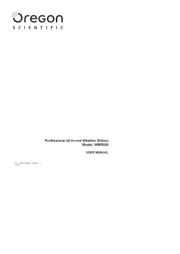
14 December 2024
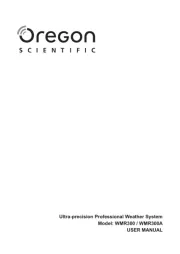
14 December 2024

14 November 2024

14 November 2024

14 November 2024
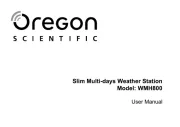
14 November 2024

14 November 2024

14 November 2024
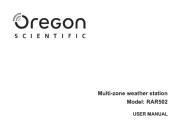
14 November 2024
Handleiding Weerstation
- Mebus
- Elro
- Ease Electronicz
- Sencor
- EQ3
- Soehnle
- Minox
- Ade
- Lowrance
- TFA Dostmann
- Cresta
- EMOS
- Meade
- ECG
- Taylor
Nieuwste handleidingen voor Weerstation
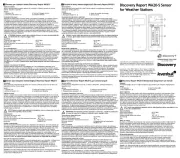
10 September 2025
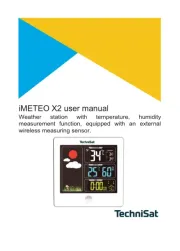
3 September 2025
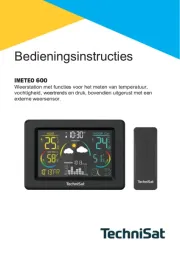
3 September 2025
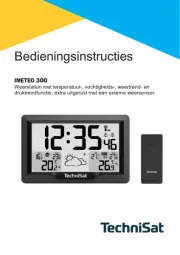
3 September 2025
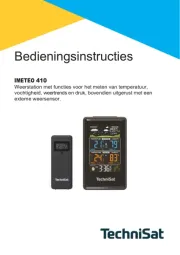
3 September 2025
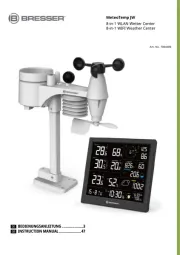
14 Augustus 2025

14 Augustus 2025

9 Augustus 2025
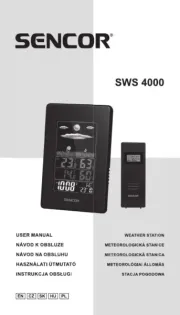
8 Augustus 2025
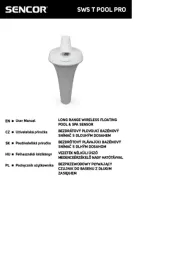
8 Augustus 2025